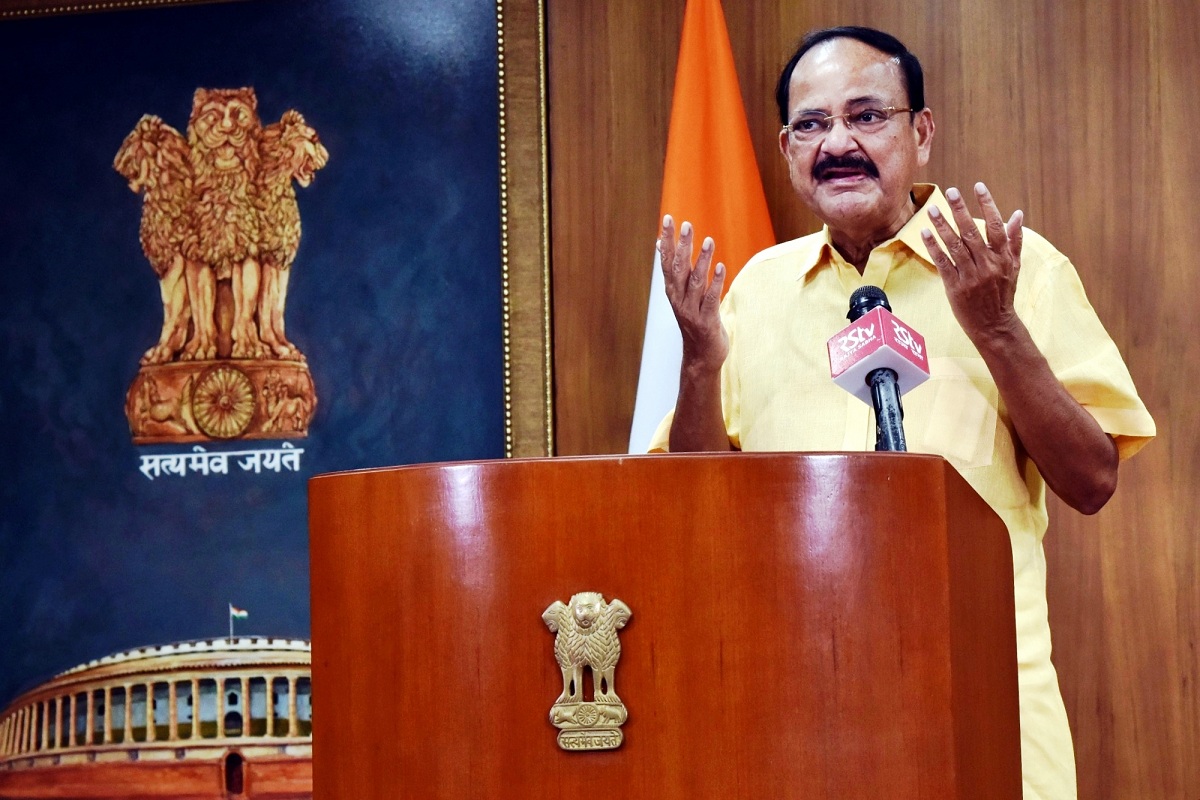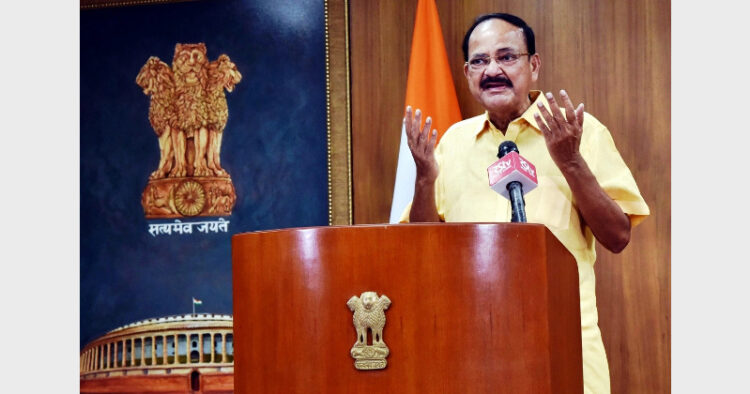
Vice President of India and Chairman of Rajya Sabha Shri M.Venkaiah Naidu yesterday asserted that none of the three organs of the ‘State’ can claim to be supreme as only the Constitution is supreme and the legislature, the executive and the judiciary are bound to work within the respective domains as defined in the Constitution.
Addressing the inaugural session of the 80thAll India Conference of Presiding Officers at Kevadia, Gujarat, Shri Naidu urged the three organs of State to work in harmony guided by the spirit of mutual respect, responsibility and restraint for the cause of nation building. He expressed concern over the instances of each of the three organs encroaching into the domain of others.
Also expressing concern over the functioning of the legislatures, Shri Naidu, referring to the Presiding Officers as the ‘high priests of temples of democracy’, urged them to ensure the sanctity of these temples. Stating that legislatures are the cornerstone of democracy that provide the basis for the actions of both the executive and the judiciary, Shri Naidu referred to the public opinion turning against the law-making bodies and the legislators over the years. He noted that frequent disruptions, conduct of legislators both within and outside the chambers of the Houses, rising number of law makers with criminal background, rising money power in elections, flaunting of power by legislators are some of the reasons for this negative perception.
The Vice President and Chairman of Rajya Sabha said “Caste, Cash and Criminality replacing Conduct, Character and Calibre as the criteria for selection of candidates has been eroding the stature of legislators and their members”. Shri Naidu urged the political parties to introspect about the present state of affairs to enhance the standing of legislatures and legislators and also to ensure disruption-free functioning of legislatures.
Chairman of Rajya Sabha Shri Naidu, in particular, referred to the erosion in the ‘oversight’ (ensuring accountability of the executive to the legislature) function of legislatures due to disruptions. He revealed that even after the Question Hour was shifted to 12.00 noon from 11.00 am in the Rajya Sabha in 2014, about 60% of the precious Question Hour time is still being lost due to disruptions and forced adjournments. The Chairman informed that during 2010-14, only 32.39% of question time could be made use of in the Rajya Sabha further to which the Question Hour was shifted to 12.00 noon towards the end of 2014. He lamented that even after this rescheduling, in the very next year i.e 2015, only 26.25% of question time was availed. He further informed that during the five year period of 2015-19, utilisation of question time increased to 42.39% which in effect means that about 60% of the time available to take the Government to task as part of the ‘oversight’ function of the House has been lost.
Shri Naidu lamented that the valuable Question Hour time is being wasted in the Rajya Sabha even after both the Houses of Parliament passed unanimous resolutions on the occasion of Golden Jubilee of the country’s independence in 1997 under which the Question Hour was not to be disrupted, members were not to enter the well of the House etc. He expressed serious concern over the trend of declining use of Question Hour over the last 30 years.
Shri Naidu said; “Decency, Decorum and Dignity of the temples of democracy will be upheld only through adherence to the other three ‘Ds’ namely, Debate, Discuss and Decide”.
Noting that the Department Related Parliamentary Standing Committees of Parliament, introduced in 1993 have been making a significant contribution by undertaking on behalf of the Parliament, detailed scrutiny of Bills, Demands for Grants and other issues chosen by the Committees, Shri Naidu urged the Presiding Officers to ensure introduction of such committee system in all the legislatures of the States. The Chairman referred to the improvement in the functioning of these Committees in respect of attendance, average duration of meetings etc during 2019-20.
On the issue of harmonious working of the legislature, the executive and the judiciary, the Vice President referred to instances of each one of them crossing the ‘lakshmanrekha’ in different degree by encroaching into the domain of others in violation of the checks and balances provided in the Constitution.
Quoting some observations of the Supreme Court concerning it’s domain and powers, Shri Naidu stressed that even the principle of ‘first among equals’ does not apply to the apex court and only the Constitution is supreme. Shri Naidu said; “We consider our ‘State’ to be in its best state when each of the three organs of the ‘State’ perform to the best of its potential in the domains specified for each of them, in pursuit of the mandate defined and in the manner prescribed in the Constitution”. It is not desirable for the judiciary to be perceived as acting as ‘super executive’ or ‘super legislature’ Shri Naidu stressed.
The Vice President noted that “There have been quite a few judicial pronouncements that gave a distinct impression of an overreach. These actions have resulted in an avoidable blurring of the contours demarcated by the Constitution.”
Higher judiciary deciding on Diwali fireworks, banning of use vehicles of certain make after 10 or 15 years, monitoring police investigations, denying the executive any role in the appointment of judges through collegiums, invalidating the National Judicial Appointments Commission Act seeking to enforce accountability and transparency etc were some instances referred to by Shri Naidu as being perceived as instances of judicial overreach.













Comments